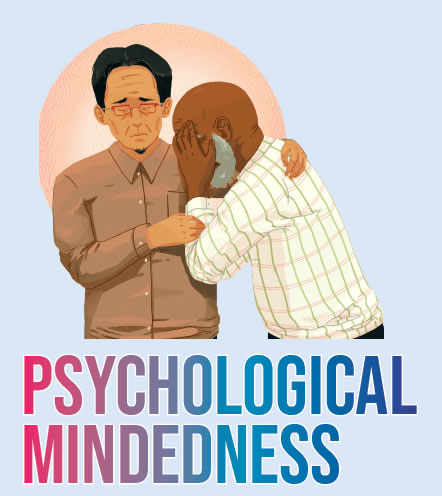Psychological mindedness refers to an individual’s ability to understand mental states, emotions, and psychological processes in oneself and others. It helps an individual to reflect on, understand, and interpret their own and others’ emotions, thoughts, and behaviours.
People who possess psychological mindedness are often more introspective and self-aware. They are capable of linking past experiences with present emotions and behaviours. This ability helps them make sense of their reactions and develop healthier coping mechanisms. Psychological mindedness is strongly associated with mental health and well-being. It allows individuals to process emotions in a healthier way, reducing stress and anxiety. It also enhances one’s ability to empathize with others, leading to stronger and more meaningful relationships. In relationships, it fosters mutual understanding and emotional intimacy. It contributes to effective problem-solving by allowing individuals to approach situations with deeper insight. Leaders with high psychological mindedness tend to be more emotionally intelligent and effective in managing teams.
On the other hand, individuals with low psychological mindedness may struggle to understand their emotions and may react impulsively. A lack of psychological mindedness can result in dfficulties in emotional regulation and communication. People with low psychological mindedness may find it challenging to express their feelings or understand the emotions of others. They often find it difficult to reflect on the psychological motives behind their actions.
However, psychological mindedness can be cultivated and improved over time with practice. Reading literature and engaging in deep conversations about emotions can also foster a better understanding of oneself and others. When individuals consciously work on understanding their thoughts and emotions, they become more psychologically minded.
Cultural factors can influence the development of psychological mindedness. In India, the parenting style and education system holds a moral and spiritual bend which at times forget the emotional realm of the individuals. Many a times students are left alone in dealing with their challenges within their psychological realm. A culture which emphasize on the concerns of family over that of the family-members, which prioritize group over the individuals may also limit self-reflection and individuals’ emotional expressions. Though there are changes recently, Indian culture still holds a stigma around mental health issues which often discourage open discussions on psychological distress.
Despite its benefits, excessive psychological mindedness can sometimes lead to overthinking. Individuals who are too introspective may become overly self-critical or anxious. Striking a balance between self-reflection and action is essential for maintaining a healthy mental state. Psychological mindedness should be


